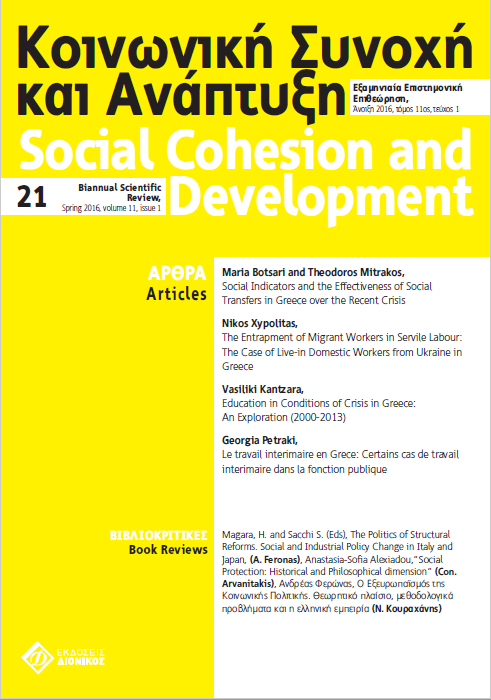The Entrapment of Migrant Workers in Servile Labour: The Case of Live-in Domestic Workers from Ukraine in Greece

Abstract
The article presents an effort to analyze the entrapment of migrant domestic workers in their low-status jobs. This will be done by looking at the consequences of live-in domestic work on migrant women from Ukraine working as servants in Athens. The study utilizes a Marxo-Weberian framework that focuses on both working conditions and perceptions of migrant workers. It is argued that the emotional demands of domestic work result in migrants perceiving their tasks as an extension of familial relationships and obligations. These employment relationships are defined as ‘pseudo-familial’ and form the basis of deference in domestic work. Combined with the structural barriers in the labour market, deference represents the subjective element of the entrapment of migrants in their job.
Article Details
- How to Cite
-
Xypolitas, N. (2016). The Entrapment of Migrant Workers in Servile Labour: The Case of Live-in Domestic Workers from Ukraine in Greece. Social Cohesion and Development, 11(1), 31–44. https://doi.org/10.12681/scad.10853
- Issue
- Vol. 11 No. 1 (2016)
- Section
- Articles

This work is licensed under a Creative Commons Attribution-NonCommercial-ShareAlike 4.0 International License.
Authors who publish with this journal agree to the following terms:
- Authors retain copyright and grant the journal right of first publication with the work simultaneously licensed under a Creative Commons Attribution Non-Commercial License that allows others to share the work with an acknowledgement of the work's authorship and initial publication in this journal.
- Authors are able to enter into separate, additional contractual arrangements for the non-exclusive distribution of the journal's published version of the work (e.g. post it to an institutional repository or publish it in a book), with an acknowledgement of its initial publication in this journal.
- Authors are permitted and encouraged to post their work online (preferably in institutional repositories or on their website) prior to and during the submission process, as it can lead to productive exchanges, as well as earlier and greater citation of published work (See The Effect of Open Access).


